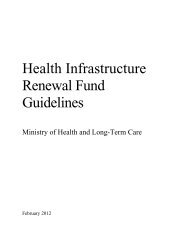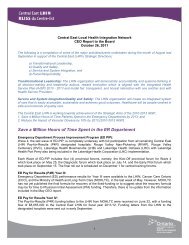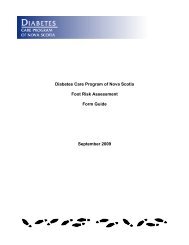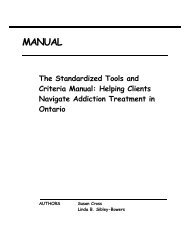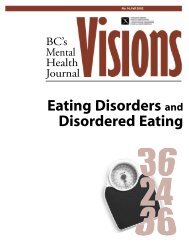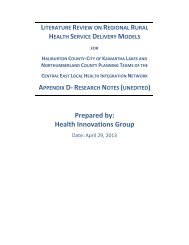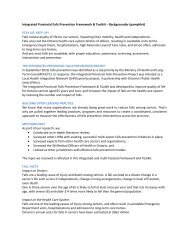CDE Appendix 1 Literature Review - Central East Local Health ...
CDE Appendix 1 Literature Review - Central East Local Health ...
CDE Appendix 1 Literature Review - Central East Local Health ...
Create successful ePaper yourself
Turn your PDF publications into a flip-book with our unique Google optimized e-Paper software.
The Culture, Diversity and Equity Project: <strong>Literature</strong> <strong>Review</strong><br />
<strong>Appendix</strong> 6: Recommended Standards for the Content of Cultural Competence<br />
Education<br />
Attitudes:<br />
• Similar to all aspects of health care professionals’ continuing education, cultural competence education<br />
should be a continuous learning process as well. Cultural competence education for health care<br />
professionals should foster a lifelong commitment to learning and self-evaluation through an ability to<br />
recognize and question their own assumptions, biases, stereotypes and responses.<br />
• <strong>Health</strong> care professionals should be encouraged to adopt attitudes of open-mindedness and respect for all<br />
patients including those who differ from them socially or culturally.<br />
• <strong>Health</strong> care practitioners should be taught techniques that promote patient- and family-centered care, along<br />
with the understanding that effective therapeutic alliances may be construed differently across patients and<br />
cultures.<br />
• As they learn about health care disparities and inequities and the factors that lead to unequal treatment, health<br />
care professionals should be encouraged to undertake a commitment to equal quality care for all and<br />
fairness in the health care setting.<br />
• To actively serve this commitment, educators can teach students ways to identify systemic or<br />
organizational barriers to access and use of services by their patients and encourage them to be<br />
proactive within their practice environments to eliminate these barriers.<br />
Knowledge:<br />
• Self-awareness and self-knowledge are the first types of knowledge cross- cultural training would seek<br />
to establish. This involves bringing to the learner’s awareness internalized beliefs, values, norms,<br />
stereotypes and biases. They should be made aware of how ethnocentrism, that is, the belief that one’s own<br />
culture is superior to others, operates in all cultures and encouraged to be attentive to the possibility of<br />
ethnocentrism in their own thinking. They should be made aware of how ethnocentrism may influence<br />
their own interaction with patients.<br />
• Essential to their understanding of both themselves and their patients is an understanding of the concept of<br />
culture. The theory of culture makes clear the connections between worldview, beliefs, norms and<br />
behaviors related to health, illness and care-seeking in different populations. In this regard, practitioners<br />
can be taught to explore how their own cultures, including the cultures of biomedicine, inform their<br />
perceptions and behaviors. All people operate within multiple cultures.<br />
• Information about local and national demographics would be part of a health professional’s cultural competence<br />
education. This should include attention to specific populations, immigration and changing demographics,<br />
such as alterations in age or occupational distributions. Students/trainees should be encouraged to<br />
draw implications from this information for their current and future professional practices. Organizations<br />
should have a process in place to reassess relevant demographics on a consistent basis.<br />
• Practitioners need to know the legal, regulatory and accreditation issues which address cultural and<br />
linguistic issues in health care. These would include such things as the position of the federal<br />
Department of <strong>Health</strong> and Human Services (DHHS) on civil rights and language access, federal and state<br />
cultural competence contract requirements for publicly funded health care and state legislation around<br />
the provision of language services and culturally sensitive health care. The DHHS Recommended Standards for<br />
Culturally and Linguistically Appropriate <strong>Health</strong> Care Services should be reviewed.<br />
126



